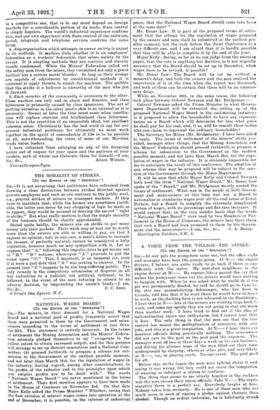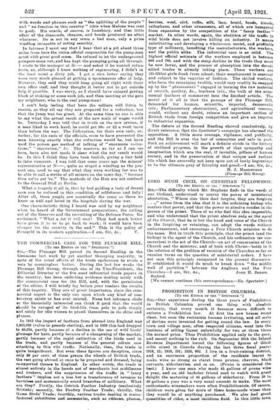A VOICE FROM THE VILLAGE—THE STRIKE. [To THE EDITOR Or
THE " SPECTATOR."] SIR,—At our pits the pump-men came out, but the office staffs and manager have kept the pumps going. At N— the engine drivers, I believe, are quite ready to go back if there is any difficulty with the water. My next-door neighbour is the engine driver at H—. He repeats like a parrot the cry that unless the pump-men came out the miners would have nothing to bargain with. When he was asked what he would do if the pit was permanently flooded, he said he should go to Canada. On this our perambulating fishmonger, who has been to Canada, told him that if he went there he would have to lease to work, as the slacking here is not tolerated in the Dominion•. I hear that in N— lots of the miners are wanting to go back to work, and some say openly they are not going to stay out more than another week. I have tried to find out if the idea of nationalization raises any enthusiasm, but I cannot hear that it does. The only thing is that the men see that the late control has meant the multiplication of overseers, with soft jobs, and this is a great temptation. At N— I hear there are fourteen officials doing practically nothing. The mine-owner did not care in the past as the pool paid the expenses. The manager went off two or three days a week on his own business, and during his absence some of the men filled out their time underground by sleeping; others at other pits, and very likely at N—, -too, in playing cards. No one cared. The pool paid for all
Before this strike began the men were talking about it and saying it was wrong, but they could not resist the temptation of wanting so indulgent a system to continue. The thing that seems to me utterly hopeless is the reckless way the men choose their union officials. Take N—. The repro sentative there is a perfect ass. Everybody laughs at him. Nobody takes him seriously. • He is one of those men who are much more in need of signing a pledge against rhetoric than alcohol.- Though an ardent teetotaler, he is habitually drunk with words and phrases such as " the uplifting of the people " and " no freedom in this country " (this when Malone was sent to gaol). His oracle, of course, is Lansbury, and that little affair of the diamonds, cheques, and bonds produced no effect whatever. He is not in any sense a bad man, only a prize windbag incapable of acting sensibly.
In fairness I must say that I hear that at a pit about three miles from here the union official responsible for the pump-men acted with great good sense. He refused to let the underground pumpers oome out, and has kept the pumping going all through. I wrote to the manager at H— and asked if he wanted volun- teers, as, although I knew nothing of engineering, I didn't in the least mind a dirty job. I got a nice letter saying they were very much pleased at getting a spontaneous offer of help. However, they said they could keep going all right with their own office staff, and they thought it better not to get outside help if possible. I was sorry, as I should have enjoyed getting black at stoking or some such job, and then meeting at the gate my neighbour, who is the real pump-man!
I can't help feeling that here the colliers will listen to reason, as they all say they are prepared for a reduction, but that the jump was too great. At the same time no one is able to say what the actual result of the new scale of wages would be. Yesterday I was told that in truth on the new system, if a man liked to work hard, he could get 30s. or £2 a week more than before the war. The Federation, for their own ends, or, rather, for the ends of the officials, seem to have prevented the men knowing exactly what the reduction would be, but have used the poison gas method of talking of " enormous reduc- tions," " starvation," &c. The masters, as far as I can see here, have also not made it clear what the net result would be. In this I think they have been foolish, giving a fair field to false rumours. I was told that some years ago the miners' representative at N—, quite as stupid a windbag as the pre- sent one, used to say that what they were working for was to be able to call a strike of all miners on the same day, " because then we've got 'ee." The methods of the Hun are not confined to the General Staff at Berlin.
What a tragedy it all is, that by bad guiding a body of decent men can be reduced to this condition of selfishness and folly ! After all, these people are essentially the same as those we knew so well and loved in the hospitals during the war.
One characteristic thing I heard was said by my neighbour when he heard of the Government preparations, the calling out of the Reserves and the recruiting of the Defence Force. He exclaimed, " What a lot it will cost! They had much better have given it to us to go back to work; it would have been cheaper for the country in the end." This is the policy of Danegeld in its modern application.—I am, Sir, &c., V.



































 Previous page
Previous page